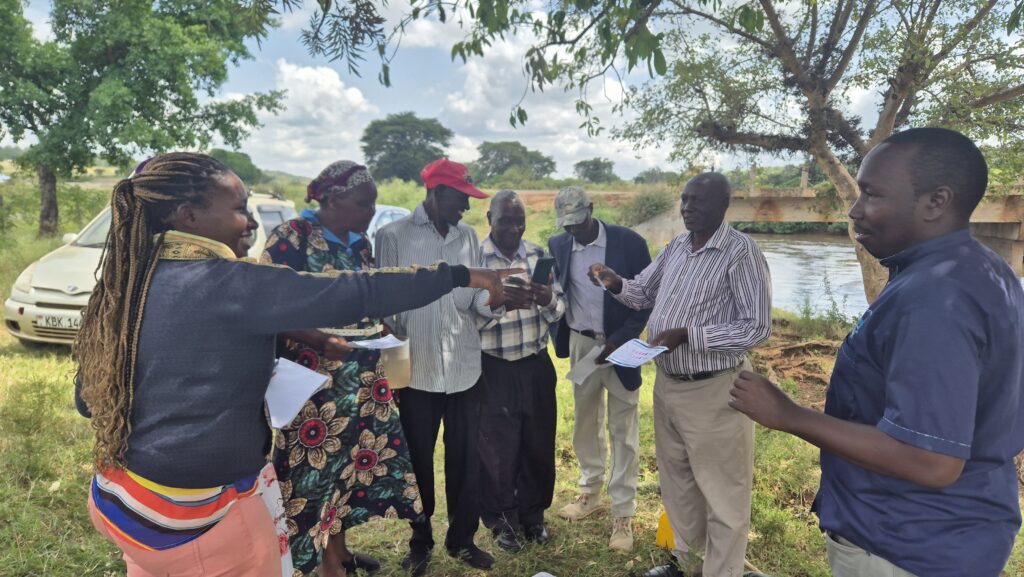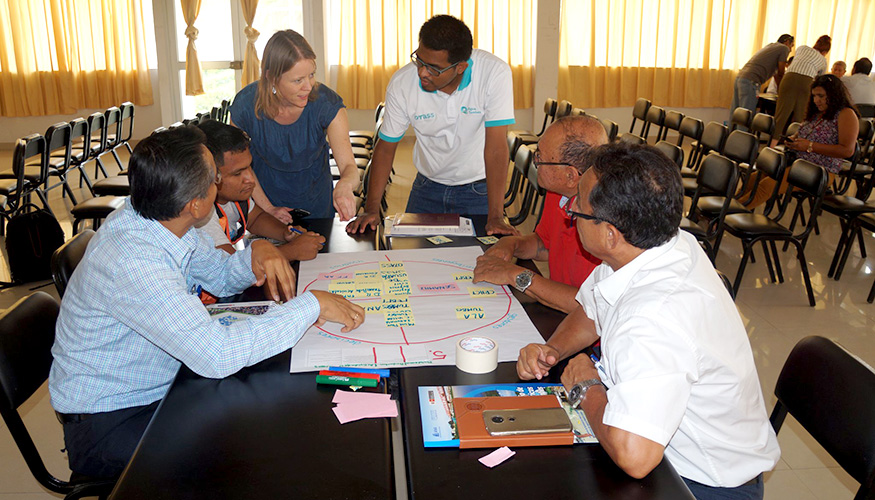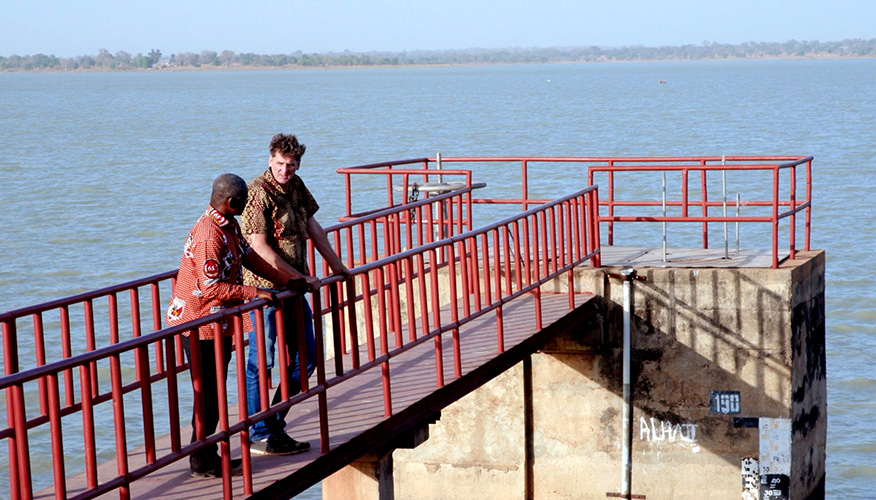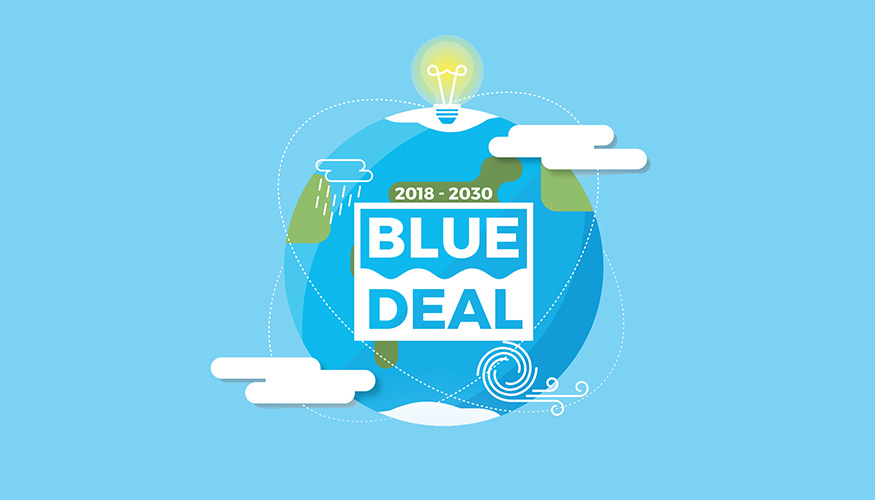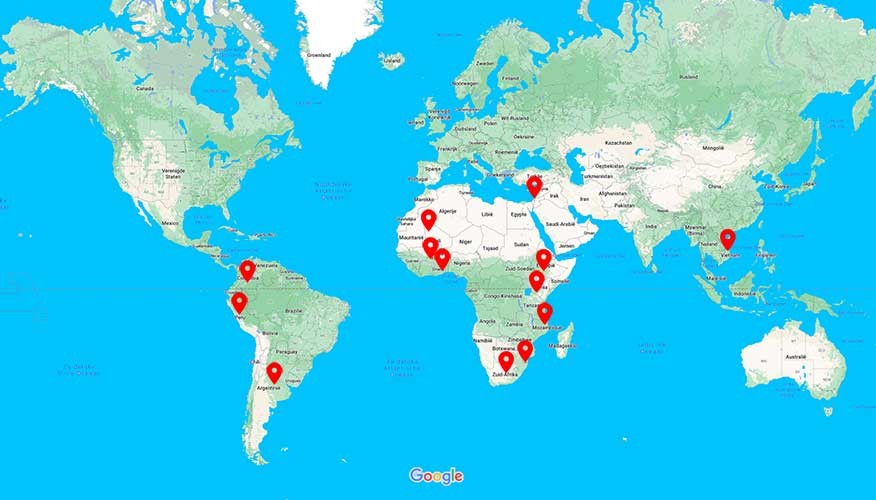Voice-over: Water: ” For some it is the most precious commodity, because they have too little of it and have to cope with severe drought. For others it is a deceptive enemy, because they face too much of it and need to deal with subsequent floods. Water pollution is also a coexisting problem causing health issues across many countries. To overcome these challenges is not an easy task. That’s why the Dutch Water Authorities, the Dutch Ministry of Infrastructure and Water Management and the Ministry of Foreign Affairs set up the Blue Deal program, as part of their international water ambitions.”
Voice-over: “The Blue Deal program has the objective to help 20 million people around the world to gain access to clean sufficient and safe water by the year 2030. Blue deal offers the regional water authorities and ministries the opportunity to support regional and national governments in other countries with more resources than are currently available. And for a longer period. Not like an investor or project developer but as a partner that helps find solutions, particularly regarding water governance where the Dutch are leaders in the industry.”
Voice-over: “Blue deal has three main goals: clean water, sufficient water and flood prevention. Clean water is a huge challenge water. Scarcity poor water quality and inadequate sanitation are causing millions of deaths every year. The Blue Deal partners want to reduce the discharge of untreated industrial effluent, improve the processing of household effluent and advance the quality of ecosystems. In Ethiopia clean water is extremely scarce. The population is growing rapidly and water sanitation is almost non-existent.”
Tigist Gelebo- Waterprofessional Ethiopia: “So many industries on this site are dumping their industrial waste into the river. Which is highly affected the health of people using the river. Who rely on the river for drinking water and for water for their cattle.”
Voice-over: “The main goal of the Blue Deal partnership in Ethiopia is to prioritize the sanitation of wastewater. With help from the World Bank the Ethiopian, partners are going to build a number of sewage treatment plants. With the Blue Deal the Dutch Water Authorities make sure that these plants are maintained properly, so that water quality can be ensured for the long term.”
Henry van Veldhuizen – Dutch Water Authorities waterschap Vallei en Veluwe: “We can contribute to organize it in a good way. And what we are going to do is, we try to help them to organize it by giving trainings. For example on awareness; on contract management; on operating and maintenance of wastwater treatment; workshops on planning; on design; and construct of treatment plants.”
Voice-over: :”Eight wastewater treatment plants have already been built in Mali, but they do not function well and are not properly managed. The main focus of this Blue Deal partnership is to improve the operations at the plants by supporting and strengthening Angesem, the responsible operator. The treatment plant in Bamako was designed to filter sewage, but instead now only processes industrial waste. The treatment plant therefore does not function as it should. Sewage is dumped into the river some remote wasteland or used in agriculture. All of these practices are dangerous to the environment and public health. Together with Angesem the Dutch water professionals are working to change this situation.”
Koen Maathuis – Dutch Water Authorities Waternet: “So the Blue Deal is very important for our partnership with Angesem. Because it gives us a very wide and long horizon. The Blue Deal is a program till 2030 which means that we can partner with Angesem 12 years. The Blue Deal program is about strengthening local capacity. We believe that strengthening local capacity is the only way to create a sustainable organization and sustainable situation for water management and wastewater management in in Mali. With the Blue Deal we can hugely contribute to that.”
Ouma Djeneba Konake – Head of Sotuba Water Water treatment plant Angesem – “The blue Deal partnership helps us to achieve our goals. Now that the wastewater treatment plants have been built, we need ‘capacity building’ and a new organizational structure to improve our people’s knowledge of water management. I think the Blue Deal will tackle these issues with us.”
Voice-over: “Sanitation is of course important but pollution is another significant aspect threatening clean water. Groundwater is also being polluted. One example in Ghana is the waste from gold mines that create huge problems in the water system.”
Carel Nobbe – Dutch Water Authorities waterschap Aa en Maas: “As I think mining and especially gold mining is a big problem in Ghana. Of course a lot of legal mines could arrange then they pay for polluting the water and taking water. But the ‘colosseum’ says it, as it’s called here, the illegal mining of gold, is getting more and more over hand. People are doing that a lot and that’s really a problem for clean water, for the quality of water. Because mercury, cyanite and other heavy metals then end up in the water. The cattle get sick, people get sick, it’s a real water quality problem. So that is something we should do about.
Voice-over: “In the coming 12 years Blue Deal wants to initiate an integrated approach to prevent this pollution. Introducing other ways of mining that will create less pollution than currently.”
Voice-Over: “In many countries the division of water is a big issue in some places there is far too much water while other regions are dealing with drought. Sufficient water for everyone is the second goal of the Blue Deal.”
Ewoud de Jong Posthumus – Dutch Water Authorities Waternet: “I’m sitting here on a dam and these structures are applied in Burkina Faso to retain the water. To collect the water in the rainy season and to have a buffer, so you can use it in a dry season for irrigation for the production of drinking water. In Burkina Faso there are over thousand dams and most of the dams were constructed in the 80s, by donor aid. And now 30 years later, you see that a lot of dams are in a really bad state. There’s a lot of maintenance that needs to be done. And as part of the Blue Deal program we develop training modules on how to maintain dams. We also help to establish local water committees ,which are the local representatives of the water authorities, who carry out the external maintenance. So they go into the field, they repair the dams, they talk with framers about best practices. What they should do, what they cannot do.”
Henk Post – Dutch Water Authorities waterschap Drents Overijsselse Delta: “The local water agencies, they are in in the first stadium. And I think in 10 to 12 years they will be fully grown. That will give also a durable existence to the regional water authorities here and in Burkina Faso. When you worked with them for 10 years, they are able to do the improve their work and to become really water agencies; independent of all the foreign projects.”
Gislain Kabore – Director Water authority Nakanbe: “We always say: “if there was no Blue Deal, there should have been one”. Because we know that the Dutch have proven to have a lot of hydrological knowledge. The Netherlands is a country in the water, Burkina has the opposite, which is very dry. I think we can work well together”
Voice-over: “Climate change is triggering more extreme weather. In Colombia Blue Deal is helping its partners adapt to these changing circumstances.”
Ellen Bollen-Weide – Dutch Water Authorities waterschap Rijn en IJssel: “Colombia always has had enough water, too much water. It’s a very rich country in water. But nowadays they see years where there is, well not sure that’s but maybe, short us in a short time. And even when with climate change coming. Well they’re really fear, that in some time maybe they won’t have enough. A lot of organizations in Colombia have some fear to execute projects. So they continue in studying, studying and even more studying. Or they think, well maybe it’s their responsibility and not ours. So it makes that there is a lack of implementation power. We think that our experience and our ideas about how to execute projects and measures will help. That it may be inspiring for them, to hear about this and will inspire our Colombian partners. And to make them better Water authorities.”
Eber Yoni Estrada – Visser: “This collaboration is extremely important to us. Because we don’t have this in Colombia, a collaboration of this magnitude with such an enormous knowledge and experience exchange. The Netherlands has the technical knowledge to help us with the problems of our water system. So we hope that they can help us get our water governance in better order, so that our water system gets the attention it deserves.”
Ellen Bollen-Weide – Dutch Water Authorities waterschap Rijn en IJssel: “What I like specially about the Blue Deal, is that we don’t have a snapshot or a year for co-working. We have a perspective to work together for well maybe till 2030. That’s incredible. Not having to bother of how to find the money, how to get acceptance. No, we know that we will work together for a long period. And that is important, because improving and strengthening an organizational structure is not something that can be done overnight. It just takes a lot of time. Now we can become friends and partners for a long time and that’s a good thing.”
Voice over: “Another one of the three goals of Blue Deal is flood prevention. In Argentina there are lots of floods occurring in the province of Buenos Aires. In all the Blue Deal partnerships the primary focus is to establish successful water governance. In Argentina the Dutch Water Authorities and local partners aim to achieve cooperation between stakeholders to limit the damage being caused by flooding problems.”
Ines Macchi – farmer: “The water-related problems that we, as farmers, experience here have to do with salinization of the soil and the fact that we are below sea level. If this is not resolved quickly, we will all soon disappear underwater. We must regulate our water system better, otherwise we will perish. So I am very happy and grateful that the Netherlands is helping us with this, because they are the best in water management. It is really crucial for Argentina to improve their water governance. All water organizations must learn to collaborate with stakeholders and other public administrations. So we work together with the province, the municipalities, other organizations and also a national park, to form a local water authority with them, comparable to our water authorithies. Where everyone contributes to solving the problems. Organizationally, but also financially.
Marcela Laguzzi – Dutch Water Authorities Waterschap: “In Argentina the most urgent problem is how to manage flooding. The country is too huge to control the flooding like we do in the Netherlands. But they also want to go on with their life, they want their villages to be accessible and they want to have agricultural production and to be able to export it. So I think the focus should be flood prevention. And but most important on measuring flood prevention and therefore you need measurement systems to make it manageable.”
Voice-over: “In Burkina Faso it is possible to see the work that has been put in place for flood prevention.”
Etienne Nacoulma – World Waternet: “At this moment is very dry but during the rainy season the water will come very fast, because this region is situated at a low level. As you can see this structure is able to hold the sand. And it prevents the sand from flowing into the reservoir. If the sand comes into the reservoir, less water can be storage and then it can cause floatings in this area. Within the Blue Deal program we are looking at how we can retain the sand even better. And floods can occur. That’s what we do here for water safety.”
Voice-over: “Blue Deal aims high and thrives on ambition. This is also true for the countries and local partners. They work with as well as for the Dutch water professionals who are involved in these partnership.”
Henk Post – Dutch Water Authorities waterschap Drents Overijsselse Delta: “You are here on your own. There’s nobody to talk to if have to make a decision. Sometimes this warm or you don’t have a good cellphone connection. You learn to work on all conditions.”
Ellen Bollen-Weide – Dutch Water Authorities waterschap Rijn en IJssel: “Sometimes, when we are evaluating a working week with specialists who where there, we are wandering what they learn from us but we learned so much from them. We have so many ideas to bring back to our work in the Netherlands.”
Carel Nobbe – Dutch Water Authorities waterschap Aa en Maas: You become far more flexible, because you know at the end of the day things will turn out right. You don’t worry about when something is not exactly as you thought it was. In Holland we are used to program everything 20 years ahead. But you can’t program everything. So I think that’s something I learned in the work in Ghana and Burkina Faso.
Marcela Laguzzi – Dutch Water Authorities Waterschap: “In the Netherlands everything is already arranged. And they are you can start from scratch. So for me this is a great to do.”
Voice-over: “2030 … who knows what the world will look like by then. But Blue Deals objectives are clear to deliver clean and sufficient water in a water safe environment for 20 million people. That is quite a task, but we think it’s doable with all the enthusiasm and goodwill from our local partners together with the dedication of our Dutch water professionals. So let’s go for it.”
